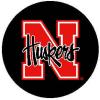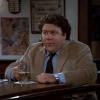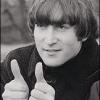Then & Now: Moe Iba
Compiled By Dave Brandon
(Photo Courtesy NU Media Relations)
 Nebraska
Nebraska
basketball Hall of Famer Moe Iba was the head coach of
the Huskers from 1981-1986, and achieved a career record
of 106-71. While at Nebraska, Iba’s teams averaged over
seventeen wins per season, and four times reached the
post-season, including the school’s first ever NCAA
tournament appearance in 1985-1986. Iba also won Big 8
coach of the year twice, and each of his six teams
finished with a winning record.
Iba recently joined HHC on the
twentieth anniversary of Nebraska’s first ever-modern
NCAA tournament birth, to talk about both yesterday and
today.
HHC: Moe, its an
honor to have you join us, and we appreciate you taking
the time to do this.
MI: No problem. It’s
a pleasant surprise to hear from you.
HHC: As a player, you started at guard for
three seasons at Oklahoma State, where you played for
your father, Henry Iba, who is probably the man that
revolutionized college basketball more than anyone else.
What was it like playing for him, and what did you
learn?
MI: Well, the thing
about playing for my father was that growing up, and
after watching the success they had at Oklahoma State,
that’s always where I wanted to play when I came out of
high school. So, that aspect of the experience made it
that much more enjoyable.
The thing that I got from playing
for my father was the philosophy that carried throughout
my coaching career, as far as knowing how to play
defense and handle players.
HHC: Upon graduating
from Oklahoma State, you took a job at Texas Western
(now UTEP) as an assistant coach to Don Haskins. While
at Texas Western, you were put in charge of the freshman
teams, and helped develop them while compiling a record
of 64-9. In fact, many of the players you developed
played on the famous 1966 team that upset Kentucky and
won the national championship. What was it like being a
part of that, and where does it rank on your
accomplishment list?
MI: At Texas Western,
coach Haskins and I were the only coaches, as I was his
assistant. So, that was truly an honor. And, the players
that we had on our freshman team did go on to play for
the varsity, as you pointed out, and I helped with them
there, too.
Winning the championship at Texas
Western was a feat that people probably don’t realize; a
small school going against Kentucky, and winning a
national championship was just unbelievable. I was very
young at the time, and probably appreciate it now more
than then. The thing that is going to be nice is that in
the next three months, a movie is coming out about that
season.
HHC: Yeah, we saw
that, and we want to ask you about that in a second.
First, talk to us about what that 1966 team did in
helping African Americans cross into college basketball.
MI: It’s funny you
should mention that. The thing that I didn’t realize at
the time was that sure, we’d played against other black
players throughout the year, but when we played
Kentucky, they had all white players and we had all
black. And honestly, I think that’s what made it such a
monumental game.
HHC: Have you had a
chance to see a sneak peak of the movie yet, which will
be called Glory Road?
MI: No, I haven’t,
although I’ve seen the previews, and we’re going to get
to preview it on November 28th in El Paso.
And I’m looking very forward to that.
HHC: So who is going
to play you, Tom Cruise, Tom Hanks, or Vin Diesel?
MI: (Laughs) I don’t
know who is going to play me, but the story is mainly
about coach Haskins, and how he got to Texas Western.
And, then of course about the national championship,
which is what the story should be about.
HHC: We’ll have to
check in with you after you’ve seen the movie. Hey,
after your impressive success at Texas Western, you took
the head-coaching job at Memphis State, where you stayed
from 1967-1970. Talk about your times in Tennessee.
MI: Well, my first year there, they were
independent, and we did well in going to the NIT. The
second year, we joined the Missouri Valley, and it was a
situation where Memphis State did not have any black
athletes. So, we recruited the first black athlete to
Memphis State, and I felt good about the progress we
made there, as far as breaking the color line. Some of
those recruits ended up going to the national finals
against UCLA, actually.
HHC: You came to
Nebraska as Joe Cipriano’s top assistant coach in 1970,
which was a position you held for eight years. Talk
about what it was like working for “Slippery Joe,” and
what did you learn from him?
MI: The thing about
Joe was that he was a very good recruiter, and people
didn’t give him enough praise for his basketball
knowledge. I think I learned more about getting the ball
from the defensive end of the floor to the offensive end
than I’d ever known before from Joe. Joe believed in
solid basketball, good defense, and he wanted to play a
fast type offense, which I learned a great bit about
from him.
Off the court, Joe and I became
very good friends, and he loved life. The way he was
taken away from us was a shame, but he was a wonderful
man, and of course, I got very close with his son Randy,
who became my assistant at Nebraska.
HHC: After your eight
years of being his top assistant, you served one year as
assistant head coach for Cipriano in 1979-1980, as he
was fighting cancer, and actually won Big 8 coach of the
year that season.
A year later, and one night before
the beginning of the 1980-1981 season, Cipriano lost his
battle with cancer, and you took over the reigns as head
coach of Nebraska. How difficult was this time of your
life, and what you remember about it?
MI: The toughest
thing was watching Joe go down hill, as far as the
cancer taking control. And the year that he was still
alive in 1979-1980, that was a wonderful year, because
he would go with the team and sit on the bench, and it
was his team. I think I got closer to him that year than
any other year. It was sad to see him go, and when he
passed away, we took over the ball club, and it was very
difficult for the players, I think. They thought so much
of Joe and rallied together, and played very well that
year.
HHC: Your first two
years as head coach at Nebraska, in 1980-1981 and
1981-1982, your teams finished with winning records, and
in the top half of the conference. However, it’s the
next season, in 1982-1983, that we really want to talk
about, as your team made the final 4 of the NIT at
Madison Square Garden. Talk to us about what you
remember about that team?
MI: Well, that team
was a very special team because it was the first year of
Dave Hoppen at Nebraska. And, he was such a big part of
Nebraska basketball for the four years he was there. The
guards were David Ponce and Greg Downing, and Claude
Renfro played one of the forwards. Our big men weren’t
very big in stature, as far as height, but they were
very good athletes. It was a very special year, and I
just thought that we got a lot out of the ability that
we had. And David came along so well during that year.
HHC: Your 1983-1984
and 1984-1985 teams also made the NIT, just missing the
NCAA Tournament. Out of all three of your NIT teams at
Nebraska, did any of them underachieve, overachieve, or
did they all play to their level?
MI: Well, I thought that they all played
to their level. The one year, and I can’t remember
exactly when it was, but Stan Cloudy got hurt, and he
was our three man. He went down, and it was a situation
where I think we’d have done better if he had been
healthy at the end of the year. So, that was
disappointing. However, those teams all played well, and
they were all teams that I will remember, and of course,
David was the key cog of those teams.
HHC: The immediate
success you had at Nebraska was quite amazing, and we
have to get your opinion on the whole “football school”
label that Nebraska has had on its forehead for decades.
Does that make it more difficult for basketball to
succeed, and was it that way when you were in Lincoln?
MI: Well, I’ve always
said that the best time of my life was when I was at
Nebraska, and I’ve always said this about Nebraska.
Because of the fans and facilities, and because of it
just being the University of Nebraska - If you can’t win
in basketball at the University of Nebraska, you can’t
coach.
HHC: Before we talk about your last
season at Nebraska in 1985-1986, we have to talk about
the illegal practice prior to the start of that season.
What are your thoughts on it both then and now?
MI: Oh… (Pause) Well,
I guess it was a big deal to a lot of people… And, we
probably shouldn’t have done it the couple times we did
it. But, we were punished by getting so many practice
days taken away, and I’m sure that it upset some of the
people on the board of regents at Nebraska. And, I’m
sorry for it, but it was something that happened, and we
worked through that.
HHC: Now that we’ve got that out of the
way… (Laughs) 1985-1986 was a monumental year in
Nebraska basketball history, as your team achieved the
first ever modern NCAA Tournament birth in school
history, and Dave Hoppen became the all-time scoring
leader at Nebraska, despite going down with a crucial
injury in the Colorado game.
How special of a team was that?
MI: Well, the thing
about that year was that David was having a great year.
We went to Colorado, as you mentioned, and he hurt his
leg in the first half, and we went into halftime and I
asked him if he thought he could play, and he said yes.
So, he went back out, and it crumbled on him real early
in the second half. To this day, I don’t think he hurt
it any further, but he had ligament damage and couldn’t
play anymore that year. I thought we had a real good
chance to win the conference championship that year with
him.
The thing that was most amazing to
me was that the next game was at home against K-State,
and we got beat very badly. And, we changed some things
within the next week or so, and went to a very small
lineup. The players we had left accepted the roles they
were put in, and played probably as good of basketball
as I’ve ever had with a very small team.
Harvey Marshall was on that team,
as was Anthony Bailous. And, probably the one player
that gathered our team together better than anybody was
Bernard Day, who was a 6’4 and a half forward that
really played well. And, Brian Carr played great at the
guard spot, so we played three guards, and those people
played tremendous basketball for the last part of the
year.
HHC: At the end of that season, and
immediately following the first round NCAA tournament
loss to Western Kentucky, you resigned as head
basketball coach at Nebraska, despite having a large
amount of success. What drove you to this decision?
MI: It wasn’t my
choice, to be very honest with you. I resigned after I
had talked to coach Devaney, and some people on the
board of regents, along with the president at the time.
They had put pressure on Bob to fire me, and would have
in the middle of that year, had he not let me stay until
the end and resign. The people who made the decision on
that were totally away from athletics, and they know
whom they are and that they made a mistake. But, I have
nothing but good things to say about Nebraska.
HHC: In your own words, what kind of
basketball coach was Moe Iba?
MI: I think I was
demanding, but fair. I think that while I was at
Nebraska, the thing I appreciated more than anything was
that the players played hard, and that’s all you can ask
for with coaching.
HHC: Talk a little
bit about Jack Moore, whom you coached from 1979-1982,
and who later died in the tragic plane crash in 1984.
What was it like having him break your Big 8 free-throw
percentage record while he played for you?
MI: Jack Moore came
from Muncie Central, and he played for Bill Herald.
Moore came to Nebraska because of Joe. And, the first
year, even though he had been player of the year in
Indiana, Jack was not real successful - He was a little
overweight.
Then, his sophomore-senior years,
you couldn’t have asked for anymore from a point guard.
He ran the point guard well, and as you said, hit all
his free throws. And, at that time, there was no shot
clock, so anytime you got ahead late in the ballgame,
you gave the ball to Jack, because they had to foul him.
Jack was voted the best little
player in the country his senior year, as far as being
under 5’10”, and was a tremendous basketball player.
And, it was not just because of his size, but also
because his knowledge of the game, and how he knew how
to run a basketball team.
HHC: What are some of your favorite
players and memories while at Nebraska?
MI: First of all, my
favorite memories of Nebraska are the people. The people
in Lincoln and Omaha were great people, but I also
always found out, that the further west you moved, it
got even better. And, I was amazed, that even when it
was 20 below, and we were playing OU one night, and I
said to myself, “My God, there will be nobody here.”
And I walked into the gym to find
it full. That’s the thing that I remember, the support
we got from the fans, and how much they loved Nebraska.
Didn’t matter what they were playing, whether it be
football, baseball, basketball, or whatever; they had
great fans.
I could name a number of favorite
players, but all of the guys who played for us were
special, and I always remember them being great
individuals and playing their hearts out.
HHC: Update us on Moe Iba’s life since
1986. What have you been doing since resigning at
Nebraska?
MI: Well, after I left Nebraska, I spent
one year at Drake University as an assistant, and then
the next year, I got a job as head coach at Texas
Christian University in Fort Worth, Texas, which is
where I live now. I coached there for six years, and had
good success, and then I just kind of got worn down on
basketball and retired.
Then, after being retired, I got
involved again, because of a former coach at Nebraska
that worked for me, John Hammond. He is the player
personnel director of the Detroit Pistons. So, he got me
involved with advanced scouting, and I’ve been doing
that the last seven years. I’ve worked for Detroit,
Toronto, Seattle, and a number of other teams in the
league. And, it’s been very enjoyable and kept me in
basketball.
HHC: That’s awesome,
we didn’t know any of that. Moe, we appreciate you
taking the time to join us. Would you be okay with
taking some e-mails from the fans at
[email protected] if we set you up an
e-mail account and tell you how to check it?
MI: Yeah, the only
thing is I don’t have a computer. (Laughs) But yes, I
can get access to it and take e-mails, and would enjoy
that very much.
Like I said, my times at Nebraska
were the best of my life, and I’ve got nothing but good
things to say about them. This has been a very fun
conversation Dave, and I really appreciate you calling.<script type="text/javascript" language="javascript">






Recommended Comments
There are no comments to display.
Join the conversation
You can post now and register later. If you have an account, sign in now to post with your account.